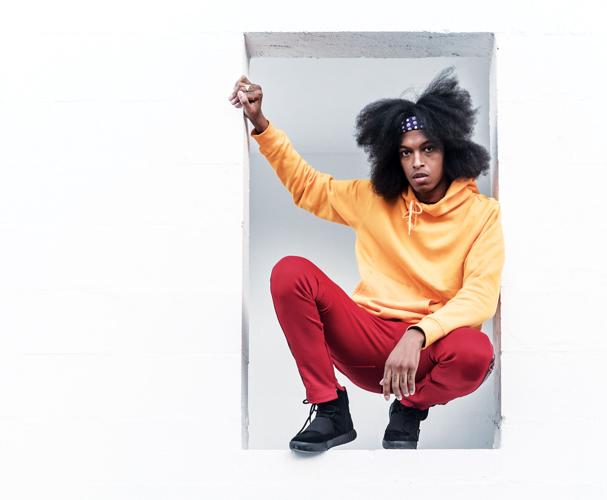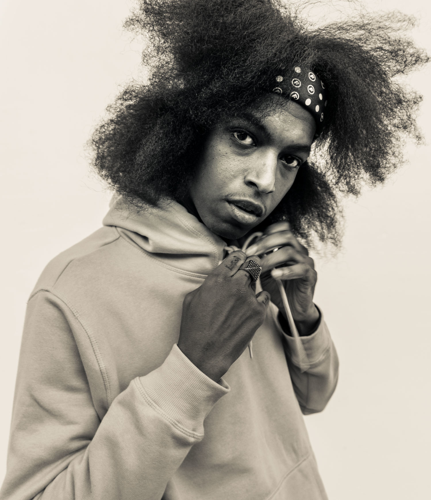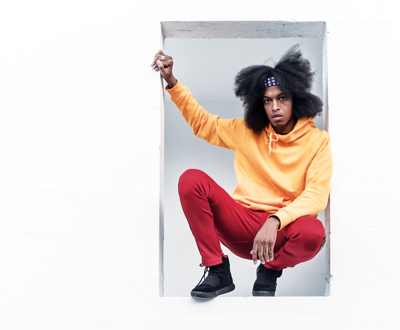
Mike Floss
Mike Floss has been a considerable force in hip-hop in Nashville for a decade, from his outstanding features to his great mixtapes (2011’s For the Rebels and 2014’s For the Rebels 2 were released under the name Openmic; 2015’s Don’t Blame the Youth was his first as Mike Floss) and his jaw-dropping debut album, this year’s Tennessee Daydreams. He’s far from the only skilled rapper in Nashville, but he’s one of the best-known names in local hip-hop, in Music City as well as outside it. He sat down with the Scene to discuss the ways Nashville rappers can get on the same playing field as musicians in other genres.
You play in Nashville just a couple of times a year. Do you want to play in town more often?
No, not really. Nashville is a good place to learn how to perform. I wouldn’t say it’s the best place for live hip-hop.
Do you think if we had more spaces dedicated to hip-hop in town, it would help rappers develop?
It’s hard to say until you try it, but I think in Nashville, there’s so many artists here. Everybody tries to latch onto hip-hop. … Everybody wants a piece of it, because it’s the biggest genre in the world right now. So I don’t think there is as much dedication to growth and becoming great as much as there is, like, “Let me just catch on to whatever’s happening right now, so I can be relevant,” you know? I think that might the problem with the shows in Nashville. You’ve got some people that really respect that it’s an art form, but then you’ve got other people that are just trying to latch onto a wave and ride it, you know? It’s tricky, but any rapper that can perform and have a successful show in Nashville can have a successful show anywhere in America.
I see showcases and cyphers where lots of good MCs perform, but I don’t often see them later at other clubs. What does local hip-hop need to grow and thrive?
I think hip-hop in Nashville is not respected by the music industry in Nashville. The people that really have power … know who I am, not because they’re paying attention to here. They know who I am because outside of Nashville, they’re like, “Mike Floss, Mike Floss.” … For everybody, it doesn’t happen that way. That doesn’t mean that they’re less talented. It just means that there is no number of movers and shakers that can make stuff for people that have an interest in hip-hop, you know? And it’s unfortunate, because there’s a lot of talent here, and a lot of people that could really be huge artists, but it’s just so hard to break, as a hip-hop artist, out of Nashville.
We need an industry structure. We need hip-hop labels in Nashville. We need hip-hop writers in Nashville — people that really are in tune with the culture and have the power to give opportunity. Because hip-hop is very much so about the way it looks, you know? There’s tons of artists who are making a lot of money, and successfully touring and all these things, who are far less talented than the artists in Nashville. So it’s all about the perception. We have to have people here that can control that perception, but we don’t. There are a couple people here, but there’s very few people here that can push a button in the hip-hop world and it does something for your career outside of Nashville.
Anyone listening to Tennessee Daydreams can find themselves in the stories you’re telling, and once we’re in, the impact of things like institutionalized racism and police brutality really starts to hit home. Did you set out to do that?
Nah, I just hoped people would like it. At the end of the day, that’s what it comes down to. Like, my opinions are my opinions, but I want to make great music, and the definition of that music being something people can enjoy. … I want to be a beacon for black culture for sure. I look up to Nina Simone, and Public Enemy, or whoever was making a statement about the reality of being black in America. Kanye West. These people are speaking for us, when a lot of times we’re so marginalized and we’re so reduced that we don’t have the opportunity to make that statement.
I want to be one of those people that uses my platform, as big as it could possibly get, to say the best possible thing I can say to speak for the culture, and to speak for black people across America. So hopefully, like you said, with institutionalized racism and police brutality — things I’ve been a victim of, things I’ve been a survivor of — it’s important for me to tell that story, because a lot of people don’t know that it happens. They think that it’s this hoax in the news, and it’s not a real thing. … Some people really can’t understand that it’s not just a headline. This is people’s lives that’s getting messed up. The police messed my life up for, like, five years until I could go back, get my record expunged. It happens, man, and I think it’s important for artists, especially hip-hop artists, to speak out on that.

Mike Floss
Did you ever consider shopping Tennessee Daydreams to a label?
We thought about it, but I don’t think I’m in a position as an artist as far as fan base where I can demand the money that I feel like I deserve. So until I’m in that point, I’m going to stay independent. … I think the record label is dead. I feel like that’s a dead business model. I don’t think that it’s very important anymore. I think there’s a lot of other ways to get money from companies. Don’t fall for record labels. So if I can continue to grow my fan base and extend my reach as an artist, I feel like that’s much more important than trying to get a deal, you know? I know a lot of guys that have record deals that it didn’t help them at all.
Would you ever try to help other people put out records? If not as a label, how would you do that?
It’s really just about influence. Like, if me saying, “This person is dope” gets other people to listen in a way that can change their life, then I would start a record label. If I can’t do that in, like, one tweet, then I don’t think that it’s much value. I’m still trying to build myself, still trying to build the people that I work with. We’re all working together, and we’re trying to get to this point. So, if I’m not at that point, what value do I really offer to others?
Do you think you’ll be able to get to that point and stay in Nashville?
To be honest, I’m one foot in, one foot out right now. I want to stay in Nashville, but with the things that I’m doing, I just don’t see Nashville being the best place right now. Like, if there was more opportunity for me here, then I could see, truly. I’m always going to be doing stuff for Nashville, period. Like, I want to be like Jack White, you know? I want to be able to say, “OK, I’m going to put a Third Man in Nashville, and we’re going to do stuff there that’s going to create opportunities for people here.” But the only way I think I can do that as a hip-hop artist from here is to continue to expand. I think there’s a glass ceiling in Nashville for every hip-hop artist. It seemed like there’s this code that we can unlock that’ll just open the floodgates. I don’t think I believe in that now. I think that we have to really get out there. We have to travel the world and figure out what works best for us and for our business, and bring it back home after.
It’s not like Ducko McFli, who got his start here, got to work with Mike Will just by moving to Atlanta, but physically being there made it easier to get Will’s attention.
I go to Atlanta for a week and I do more than I can do in Nashville in two months. So it’s like, why not be there? It just makes sense. I used to really be an advocate for, like, “Yo, let’s all just stay here and do better than enough.” The reality, that’s kind of naive, I feel. I don’t think that there’s a way for people to make enough money to do it. At the end of the day, people got rent to pay. Rent is going through the roof, so even just to live in Nashville, you got to do so much more.
I don’t know if that’s the formula for it, to break the city. I think the formula now is for us to go other places, get the recognition, and then once we get the recognition, be like, “Oh, I’m from Nashville.” Boom. So now, it’s like we got all of this attention that’s coming back, kind of like the Canadian artists do. There’s a lot of artists in Toronto that until Drake popped off, it was like, nobody was checking for them. But once you have somebody that really makes it because they left, then you can do something, you know?
It’s frustrating, because like you said, hip-hop is the biggest genre in the world. It’s in the musical DNA of all the kids who are getting into music.
Look, people have to die for us to get what we want. There’s going to be these old people that have old ideas that are caught up on old things to die off before we can say, “This is what we want to do.” We can do it, you know, but we’re very much still living in the South. We’re very much so still living in a place where there’s a lot of old money. There’s a plantation in Belle Meade. Like, there are a lot of old values and principles that still live. ... Right now, it’s just a matter of getting in where you fit in, and making something happen for yourself, so you can put yourself in a position to be ready for that moment. ... Different venues have this strict “no hip-hop” policy. When they’re gone, we just got to swoop in and grab that property. We’ve got to have that capital to do so. So now is about positioning, and it’s about making a way.
You take somebody like Martin Luther King, or Malcolm X, or whoever, any revolutionary — they knew that this week, nothing is going to change on a major level. But I can position myself, position other people to have these beliefs and these understandings to where once the time comes, there’s an intersection of preparation and opportunity. Like, “Cool, we can make something happen.” So, I mean, I think that’s where we are now in Nashville with hip-hop. We’re just trying to put ourselves in position to be ready for those moments, and get financially prepared to change things.
Even if I go, I’ll be here, though. I’m such a flag-bearer for what this is, for what Nashville hip-hop is, and I believe in it so much. Everything I do outside of Nashville points back to here. I bring something back here and I create an opportunity for somebody, or I share some knowledge with somebody. So I mean, all of this stuff comes right back home. I’m never not going to be here.








